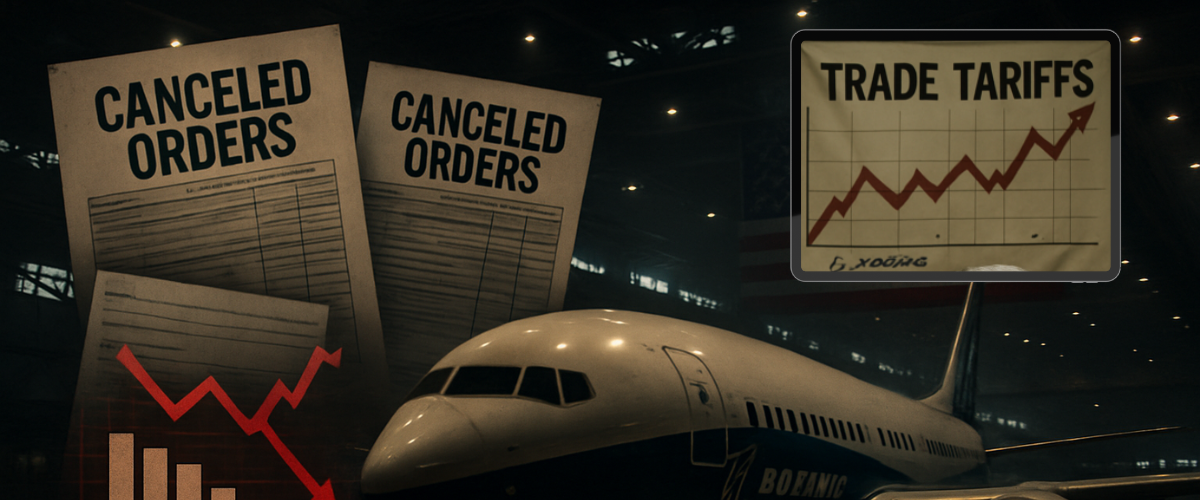The unthinkable is happening. Boeing, once the pride of American aviation and a symbol of industrial power, is facing a wave of order cancellations and suspensions from international airlines. But this time, the crisis is not caused by safety issues or economic slowdowns—it’s driven by America’s own tariff decisions.
What was meant to protect U.S. industries has now backfired, threatening to crush them from within. At the center of this economic drama is Boeing’s flagship 737 Max program, long seen as the backbone of global low-cost carriers.
Table of Contents
Ryanair Sounds the Alarm
Europe’s influential low-cost airline Ryanair (referred to as Ryionaire in company correspondence) has issued a direct warning. CEO Michael O’Leary told U.S. lawmakers, including Congressman Raja Krishnamoorthi, that if tariffs continue to push aircraft prices higher, the airline may cancel part of its massive order—valued in the billions—and seek alternatives from China’s COMAC.
This is no idle threat. Ryanair’s 200+ aircraft order with Boeing represents one of the largest in European aviation history. A pivot toward Chinese suppliers would mark a seismic shift in the balance of global aviation manufacturing.
China and India Reconsider Boeing
The tariff war has already sparked retaliation. China imposed import duties as high as 125%, effectively halting Boeing deliveries. Entire aircraft destined for Xiamen Airlines have been returned to the U.S., deemed too costly under current rules.
Meanwhile, Air India, a longtime Boeing customer, has paused discussions on future orders. While the airline has not canceled existing deals, insiders say uncertainty over U.S. trade policy and production delays are forcing it to “explore diversification.”
Tesla Hit Hard in Europe
Boeing is not alone in this fallout. Tesla, America’s EV trailblazer, is also being squeezed out of key markets.
- In Germany, Tesla sales plunged 64% in April 2025 after a 48% drop in March.
- In France, sales declined 35%, while in the UK, Tesla’s market share has shrunk to 1.5%.
European consumers are turning instead to BYD, NIO, and XPeng, Chinese EV makers offering cheaper, feature-packed alternatives. Tesla’s $5 billion Giga Berlin factory was meant to shield the company from tariff risks, but local opposition to its expansion and geopolitical tensions are eroding its foothold.
America’s Trade Strategy Under Fire
Supporters of the current tariff regime argue that strong measures are necessary to counter unfair practices from China and the EU. But critics say the policy is “self-sanctioning”, driving allies and customers toward competitors.
A Harvard trade policy expert told reporters:
“The numbers don’t lie. Supply chains are breaking down, costs are skyrocketing, and companies are being forced to look elsewhere—not because they want to, but because they have no choice.”
The Risk of Permanent Realignment
Analysts warn that once airlines and automakers diversify their supply chains, the U.S. may never regain its dominant position. COMAC’s C919, once dismissed as a niche Chinese jet, is now priced 15–20% below Boeing models—making it an attractive alternative for cost-sensitive carriers.
The EU, meanwhile, is signing new trade agreements with Latin America and Southeast Asia—many of which exclude the United States due to policy unpredictability.
Jobs and Communities at Risk
The ripple effect across the U.S. economy is profound:
- Aerospace supply chain jobs—from engine builders to avionics engineers—are at risk.
- Agricultural exports continue to decline under retaliatory tariffs.
- Manufacturing hubs in small-town America face mounting layoffs as orders dry up.
Local communities that once thrived on “Made in America” are now grappling with the painful reality of canceled contracts and shrinking markets.
A Turning Point or a Breakdown?
Congress is preparing emergency hearings on the trade crisis. Lobbyists from Boeing, Tesla, and agricultural sectors are urging a course correction. But Washington remains divided:
- Pro-tariff lawmakers insist that holding the line is essential for long-term sovereignty.
- Opponents warn that the policy is burning bridges with allies and driving away customers.
Global Trust at Stake
For decades, “Made in America” symbolized reliability and innovation. But as airlines cancel orders, automakers look to Chinese EVs, and global buyers diversify supply chains, the world is beginning to question U.S. credibility as a trade partner.
As one European aviation analyst bluntly put it:
“You can’t slap your friends with tariffs and expect loyalty in return.”
What’s Next?
With upcoming trade summits on the horizon, the U.S. faces a stark choice:
- Double down on unilateral tariffs, risking deeper economic isolation.
- Or pivot toward multilateral trade agreements that rebuild trust and restore America’s global standing.
For now, the world watches as Boeing, Tesla, and countless other U.S. industries stand at the edge of an economic crossroads.
Join us on Telegram Group , Instagram for the Latest Aviation Updates.
Also read: New GST Rules Slash Drone Prices in India — Big Relief for Buyers & Manufacturers – AeroTexts


Деятельность в области недропользования — это совокупность процессов, связанный с разработкой подземных богатств.
Оно включает разведку природных ресурсов и их рациональное использование.
Недропользование регулируется установленными правилами, направленными на безопасность работ.
Эффективное управление в недропользовании обеспечивает устойчивое развитие.
оэрн
Понятие гедонизма — это концепция, которое рассматривает приятные ощущения в центр человеческой жизни.
Согласно этому взгляду, поиск радости считается важным мотивом существования.
Этот подход не всегда подразумевает отсутствие ограничений.
Во многих трактовках он связан с умеренностью и контроль желаний.
https://graph.org/Tihaya-roskosh-iskusstvo-nezametnogo-shika-12-25
Сегодняшнее восприятие этой идеи часто акцентирует внимание на внутреннем комфорте.
При этом важную роль играет сочетание между удовольствиями и ценностями.
Данный взгляд может поддерживать психологическое равновесие.
Таким образом, гедонизм рассматривается как подход к пониманию счастья, а не как безусловное потакание желаниям.
заклепка вытяжная шт заклепка вытяжная глухая
В отличие от других КРАКЕН использует обязательную двухфакторную аутентификацию
дизайн коттеджа под ключ дизайн двухэтажного коттеджа
дизайн квартиры дизайн квартиры 58 кв м двухкомнатной